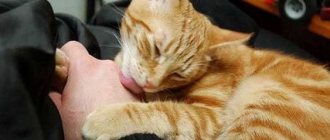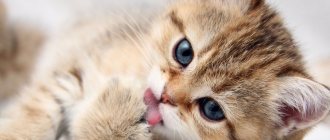“A cat is an animal that walks on its own”, “cats love everyone who feeds them” - these phrases are very often heard in conversations about representatives of the cat family, because many people are still sure that cats, unlike dogs, do not capable of feeling love for their owners. But those who have these fluffy, purring animals living in their homes clearly refute the claims that cats lack affection for people, since they have seen from their own experience that their pets are quite capable of love, but they don’t experience it for everyone.
Dogs, being pack animals, very quickly become attached to people and happily get to know and play with all the guests and friends of their owner, but cats are more picky. When meeting a new person, an adult cat may hiss, refuse to be stroked, and even scratch an overly annoying animal lover, and the cat, as a rule, treats members of the owner’s family differently - some are constantly caressed, while others are he can barely bear it. Let's try to figure out what kind of people cats love and how an owner can earn the sympathy of a purring pet if he initially dislikes it.
Ailurophilia: how love for cats turns a person into a slave
In ancient times, people idolized cats: these graceful animals protected supplies from mice and gave their owners peace and tranquility, and some even believed that they were endowed with magical powers.
Today cats are one of the most popular pets. They also conquered the Internet. But this “cuteness” also has a dark side. This is ailurophilia - a pathological attachment to cats. The RIAMO in Balashikha correspondent tried to understand the “cat disease”, its causes and symptoms. Mental disorder
The word "ailurophilia" comes from the Greek "ailuros" - "cat" and "philos" - "love". These words evoke pleasant thoughts about tenderness and affection, but in reality everything is not so rosy. Ailurophilia is a recognized mental personality disorder.
“Let’s immediately make a reservation that we should not confuse people with a pathological mental disorder and those who simply love animals very much, but within reason. There are a lot of memes about cat people floating around the internet. For example, a picture: a human skeleton is sitting in a chair, and a cat is sleeping in his arms. The message is this: the owner is “withered”, but does not disturb the sleep of his beloved pet. Cat people treat themselves with humor, and this is one of the signs that they are of sound mind,” says psychologist Maryana Nabigulaeva.
“Here is the most typical picture of ailurophilia: a person lives in a two-room apartment with 20 cats. There is total unsanitary conditions, and all the neighbors suffer from the terrible smell. The animals suffer from overcrowding and hunger - the owner is unable to feed them. A person either does not react to any complaints or claims or takes them with hostility, fiercely defending his animals,” explains the psychologist.
Sometimes people suffering from ailurophilia do truly shocking things. There are many known cases where cat lovers kept the corpses of their pets on the balcony, being unable to say goodbye to them. Others froze animals in the freezer and said that they wanted to prolong their life in this way - “after all, a cat can be thawed in 10-15 years and revived.”
Causes of the disease
Statistics say that people suffering from ailurophilia are united by loneliness, emotional instability, social isolation and low self-esteem. Single elderly women are especially susceptible to the disease, although in recent years young people, including men, have also begun to be affected.
“Typically, ailurophilia is closely associated with another mental illness, such as schizophrenia or dementia. Often, a pathological love for cats arises after some serious mental trauma - the loss of a child, the death of relatives, the betrayal of loved ones. In each of these cases, cats play their role: either they fill the inner emptiness and brighten up a person’s loneliness, or they give a feeling of their own superiority over other, albeit weak, creatures,” explains Maryana Nabigulaeva.
New hypothesis
In 2011, American scientists shared with the world a new hypothesis about why cats so easily “enslaved” humanity. It turned out that the Toxoplasma gondii parasites, which can be contained in cat feces, can disrupt the functioning of the human higher nervous system and cause various behavioral abnormalities in him, including a pathological love for cats.
This discovery was discussed for a long time in the scientific world, but in the end scientists came to the conclusion that Toxoplasma gondii can indeed “awaken” an uncontrollable love for cats in a person, but in very rare cases. Toxoplasmosis is also associated with the development of schizophrenia.
What to do?
Society certainly suffers from people with ailurophilia. Neighbors complain about the terrible smell emanating from the “bad apartment”, the constant noise and cat squabbles. Call the local police officer? He will just shrug his shoulders, because the owner of 20 cats cannot be charged - he has not broken the law.
Environmentalists and social activists supported the initiative: some with concern for animals, others with concern for neighbors who suffer from overzealous cat and dog lovers. Unfortunately, the law has not yet been adopted.
“A person suffering from any mental disorder simply does not accept the fact of his illness. And ailurophilia is no exception. It is useless to appeal to reason or openly conflict. If concerned neighbors want to help, you need to get in touch with the relatives of the cat owner. Perhaps they live in another city and have no idea of the scale of the problem. If you have no relatives, you need to go to a clinic or a neuropsychiatric dispensary together with the local police officer. Unfortunately, you are unlikely to help a person with ailurophilia in other ways,” sums up the psychologist.
Signs of sympathy
The pet owner usually understands him very well. Each cat has its own conversation, its own “dialect.” Sympathy can be expressed like this:
- purrs;
- licks himself;
- bites gently;
- caresses, caresses;
- follows you around;
- sleeps in the same bed;
- loves to lie on laps;
- shows belly;
- twitches its tail;
- rubs against arms, legs;
- sharpens his claws wherever necessary;
- brings “gifts”;
- tramples on you, massages you.
Psychological facts
Forgiving early wake-ups in the morning, scratches on legs, the habit of using furniture instead of a scratching post, and other “charms” of having a cat in the house allows for something more that these pets give in return. People like them because they allow:
- Get the "source" of daily fun. In terms of their ability to amuse people, cats are unlikely to have many competitors, because they are able to take funny, touching poses, fall asleep in unexpected places, and create other reasons for smiling.
- Give your care. Sometimes you might think that one of the main purposes of a cat is to be an object of care and love. Their main weapon is a muzzle with a neat nose and big eyes, soft fur that you constantly want to stroke and squeeze - even adults “turn on the love” for these animals.
- Heal your “sore” places. Bioenergeticists are confident that the positive aura of cats helps relieve fatigue and migraines, has a beneficial effect on normalizing blood pressure and pulse, and reducing pain in diseased internal organs.
- Feel needed. Cats sense well when their owner is upset and angry, so they are ready to come to him for comfort. At the same time, their purring acts as a sedative. It’s not for nothing that they say: a dog is a friend of man, a cat is a friend of the soul.
- Think about literary works. In different eras, Russian writers made these animals the main characters of their works, endowing them with intelligence and cunning. Just look at the cat Behemoth from “The Master and Margarita” by M. Bulgakov or the scientist cat from Lukomorye by A. Pushkin.
- Awaken or realize parental instincts. It is their manifestation that serves as a source of love for cats and care for those who need it. In addition, meowing is sometimes called mimicry of a child's cry. Indeed, life with these pets is in many ways reminiscent of life with a child, although for some, such “humanization” of animals is perceived as a surrogate for motherhood.
- Remember femininity. For some, a cat's grace, grace, beauty, and the ability to “show her claws” at the right time are the embodiment of feminine nature. It’s not for nothing that cat tattoos are one of the most popular themes.
Scientists who study human and animal behavior believe that love for cats is genetically determined
In ancient times, large felines posed the greatest danger to people, so it was important to monitor them and study their habits. And love and admiration have already become a by-product of such observations and have been consolidated over many years of coexistence
Hunting and food
And although cats are simply amazing hunters, they do not need to hunt at home. Just like they don’t need to protect their homes. The breadwinner and protector is the owner, whom the cat treats more like a parent. This is manifested in the way she shifts from foot to foot, gently rubs her legs, showing her affection. This is exactly how a kitten communicates with its mother. Hunting for a domestic cat is entertainment, an instinctive desire. She can catch a mouse, a fly or a bird. Quite rarely, a cat decides to attack a huge rat with sharp teeth that can cause her pain. The domestic cat brings its prey into the house. This is a gift for the owner, an expression of true friendship and care.
How can I help the grief?
It is often said that with old age, character deteriorates, a person becomes grumpy, intolerant, unbearably suspicious or overly anxious. Psychologists believe that it is not a matter of character damage, but that the loss of mental and physical strength leads to a weakening of control. Previously, a person could control himself, somehow monitor his manifestations, but over the years, self-control weakens and what was previously hidden begins to reveal itself, sometimes in the most inadequate forms.
What should relatives do if their grandmother got a dozen cats? Of course, you can feel sorry for your grandmother and be forgiving of her weakness, or try to appeal to her reason, wasting time on fruitless persuasion, but... unfortunately, the grandmother herself can take any help with hostility, an attempt to clean her apartment or somehow help animals - violence against yourself and cats. And such aggressive behavior once again confirms that the grandmother does not care about cats, but about the safety of her illusory world, where she is the arbiter of the fate of stray cats.
No matter how bitter it may be for your relatives to admit this, it will be almost impossible to explain something to your grandmother with reasonable arguments. Attempts to deceive or persuade will most likely lead to a nervous breakdown of the persuader himself. Moreover, such a situation usually indicates that dialogue with relatives has already been lost.
Depending on the possibility and desire of the relatives, if the situation is close to extreme, uncontrollable, guardianship can be granted over the grandmother - then a relative can make all important decisions for her. You can invite a gerontologist or psychiatrist to visit your grandmother, and do not say what kind of doctor will come, just say - a “doctor” will come.
The specialist will better assess the grandmother’s condition and can prescribe her the necessary medications. You can hire a nurse for such a grandmother, invite a cleaning lady.
There is no need to ask grandma herself for permission to clean the apartment or give away seventeen extra cats, etc. We must try, as calmly and firmly as possible, to bring the situation closer to normal and in the future to maintain order in the elderly person’s home ourselves. It’s not a sin to think about the suffering animals that ended up with such a mistress - untreated, poorly fed, lousy. They would be much better off in the trash heap. If it’s a shame to throw them out there, then you can turn to people who take care of animals and place the cats in shelters.
Because, although we do not have a law stating that you cannot keep twenty cats in an apartment, there is an article of the Criminal Code on cruelty to animals, and in the case of abnormal living in an apartment of dozens of cats, this article is most likely violated. This can be used by neighbors who suffer from the inevitable smell or fleas in such cases.
Elena Zagorodnaya, clinical psychologist
Photo: facebook.com
Mother cat and offspring
Cats are very caring and devoted mothers. They constantly lick the kittens, stimulating the babies' blood circulation and breathing. Animals raise their offspring through play and silent communication. If there is a threat of danger, the cat may drag the children to another place. But the connection between mother and child does not last long. As soon as the kitten grows up, the cat loses interest in him, perceiving him as a young male or female.
Regardless of which pet you decide to place next to you, remember that the psychology of cats, dogs and other animals works differently. And, before bringing a new tenant into the house, it would be a good idea to study the main behavioral features of the future pet, so that in the future his pranks, play or aggressive behavior will not become an unpleasant surprise. Once in a new home, the kitten feels defenseless and unsure of itself. He needs someone who will help him get comfortable in a new place, protect him from dangers and become a true senior comrade. And cats never forget kindness, an affectionate attitude, as well as pain and fear. And all these feelings are usually associated with a person. Take care of your cat, caress it, do not hold it by force, do not punish it too harshly, and it will become your faithful friend for many years.
What do cat poses say?
It is generally accepted that felines are more liked by straightforward, frank and fair people. Cats, whose psychology is structured differently from dogs, can become their true friends, but not slaves. You can find someone with a cat if you know the peculiarities of its behavior.
You should pay attention to everything: posture, manner of movement, voice, ears and tail. Cats use more than just sounds to express needs
More often they prefer to communicate using gestures and facial expressions, and sometimes a whole set of signs.
Love for cats, whose psychology has not yet been fully understood by anyone, is an incentive to study the habits of the animal and understand it. are distinguished by grace and can tell a lot about her:
- Calm, observation - the cat sits with its tail wrapped around its paws.
- Greeting - the cat rubs against the owner’s legs, moving from paw to paw.
- Love and affection - rubs its muzzle and whiskers against the face or legs of the owner.
- Thoughtful - lying on his back.
- Warning – a sharp swish of the tail.
- Intimidation - the back is arched.
- Threat - fur standing on end, paws straight and outstretched.
A raised cat's tail indicates friendliness; a lowered and tousled tail indicates confusion. A tail pointing down and tapping the floor means the cat is scared. Nervous twitching of the tail from side to side, whipping it on the sides means the highest degree of aggression.
Dominance and the desire to suppress enemy aggression can rarely be observed among females. A mother cat, if her babies are in danger, will fight to the bitter end. She will give her life for the kittens, not retreating even from the most terrible and large enemy. But cats often, in the struggle for the affection of a young cat, can fight fiercely, finding out who is stronger. The pose when they stand motionless nose to nose expresses extreme concentration
The slightest movement of the enemy or a sharp extraneous sound can become the impetus for a brave battle. But sooner or later one of the cats is defeated
He lies on his stomach, pressing his body and head tightly to the ground, and extends his paws with claws towards the enemy. His posture expresses both submission and threat. In this case, the winner leaves first, demonstrating his dignity and superiority. Friendly relations between adult males are practically impossible.
Cats in relation to humans at home are somewhat different. They rarely express extreme aggression towards their owner. But a stranger may be scratched or bitten if he does not retreat after the warning signs. More often, aggression is triggered by fear, stress or confusion. Complete trust in the owner and others is manifested in a position on the side or back, when the stomach is open. The cat's eyes are usually closed, she is relaxed, dozing and is not at all averse to being petted.
Conversation with a cat: sounds and facial expressions
Although cats prefer to communicate with gestures, the most talkative of them purr constantly. The cat's tongue contains more than 16 signals of various ranges, including ultrasound, inaccessible to the human ear. Mothers often communicate with their kittens using such inaudible sounds. An ordinary “meow” may differ in timbre and tonality. Having learned to speak like a cat, a person will be able to convey the necessary information to the pet with similar sounds. For example, quietly hissing at a cat when it does something forbidden, you can let it know that it should not be done. The psychology of cats is designed in such a way that not all of them are too talkative. Some animals make only a few quiet sounds throughout their lives. Others, on the contrary, constantly scream, purr, growl, hiss and grumble. Here's what some cat words can tell you about your furry friend's mood:
- Hissing is a warning signal.
- Snorting – surprise, desire to distract the enemy, confusion.
- Low range rumbling – readiness for defense.
- Grunting is a threat and a warning.
- Clattering of teeth, smacking and bleating is a desire to catch prey or disappointment if this was not possible.
- Purring - the cat is happy with life.
- A cooing short “meow” is the joy of meeting, greeting.
- Vibrating with a hoarse “meow” - a friendly attitude, gratitude.
Each drawn-out “mi-auu”, “meaa-u” in most cases expresses a request, a call for help, a complaint or a cry. The degree to which a cat is talkative depends not only on its individual character, but also on its breed. The psychology of Thai cats, as well as their Siamese and Oriental counterparts, is different in that they are very talkative and sociable. British and European shorthair cats, on the contrary, are silent.
The facial expressions of all cats are very expressive due to the high degree of mobility of the muscles of the face and head. A cat's eyes are a mirror that reflects the pet's mood and state of mind. Half-closed eyelids and slow blinking mean calm, tranquility, and relaxation. Wide eyes - interest, concern. Fear is shown by dilated pupils. A narrowed gaze expresses warning and challenge. Sharply constricted pupils indicate extreme concentration. If the cat looks away, then it is ready to obey. A direct look into the eyes of the owner and ears stretched forward express interest, a request, a desire to communicate or eat. Ears drooping to the sides indicate aggression, while ears pulled back and drooping indicate that the cat is scared. If the tips of your ears twitch nervously, this is a sign of insecurity.
Talents
What kind of people do you think luck favors? Many are sure that they are talented or charismatic. These people rarely get into trouble, and if something unpleasant happens, they can turn the situation around in the right direction without any problems. And it’s not that they have a talent for persuasion or anything like that. You may have different talents: singing, photography, choreography or sculpting... In any case, you have a well-developed imagination, and you are also well-read. After all, talents require deepening into the topic.
In addition, talented people are also attracted due to the fact that they develop. Their personality is constantly undergoing changes. It's never boring with such people. On the contrary, it is very interesting and exciting.
If you want to be loved by everyone, then become a charismatic person. Look for several talents in yourself and develop them. The main thing is that you are interested and comfortable doing what you do best. And you can attract other people not only with your talent, but also with your work.
Psychology of cats - features
Everyone knows that cats are independent.
To understand how much, you can pay attention to the scientific fact: dogs “get infected” by yawning from people, but cats never repeat it after a person.
Considering the fact that repeating a yawn after someone is related to such a feeling as empathy, this perfectly explains the psychology and attitude of cats towards humans.
If you want to get a kitten, it is recommended to take into account the peculiarities of the psychology of these animals:
- Cats openly express their attitude towards humans, and not only in general, but also at a certain moment . You can often see this behavior from a pet - the cat lies on its back, clasps the owner’s leg with its front paws, and begins to make intense movements with its hind paws, similar to beating. At the moment, the pet is actually hitting the person, and not playing with him. The animal beats with its front paws - it shows its reluctance to communicate, trying to show the person that he needs to leave.
- Games . Cats are designed in such a way that they do not perceive uniform movements for a long time, simply cutting them off. This is why many owners are perplexed why their pets do not want to play with a new toy, quickly losing interest in it. If you make impetuous movements with the toy, impulsively waving it and periodically pausing, Murka will be delighted with such a game. And evenly waving, like a fan, will lead to the fact that after 30 seconds the cat will stop perceiving the object and will look through it.
- You can train a cat . The only paradox is that this takes too much time, during which a person, without realizing it, will be raised by his pet.
- For a cat, the owner is not the one who feeds him and cleans the litter box . The owner is the one who took the kitten in his arms after the mother, who raises it, even if this is punishment for pranks. And the one who feeds is just a “feeder”.
Having trouble raising a cat? It's not about her mental abilities, but about her approach to this issue. To raise a cat, you should act consistently and not rush. If an animal decides that the manipulations that a person performs with it are just nagging and a manifestation of the owner’s bad mood, it will continue to do its dirty tricks. Or it may react differently: take offense at the owner and deliberately commit unpleasant pranks.
Features of behavior:
- There is an opinion that certain breeds have a tendency towards aggression. It is not true. The pet’s malicious behavior and tendency to do “bad things” are only the result of a lack of proper attention and education, which spoils the animal’s character. With equal probability, notes of aggression in behavior can be observed in an active Siamese cat that is not properly handled, and in a British cat, endowed with a phlegmatic disposition by nature, but by chance finds himself in a family with noisy and overly active household members.
- Cats don't like dogs - not because they see them as competitors or are afraid of being their prey. This hostility is explained by the peculiarities of cats’ perception. They do not like sudden movements (unless they are made by potential prey). If a dog runs around a cat, it will not understand what they want from it - to eat or play. The result of such encounters is the same - in case of close contact, the dog will receive claws on the nose as a precaution.
- Rumbling in cats is a sign not only of complete relaxation and pleasure, but also a way to attract attention. And if the animal does not immediately get what it wants, the rumbling intensifies. If we draw an analogy, it is comparable to the human “ahem.”
- Cats are extremely rarely able to remember a specific person. At the same time, their associative connections are configured in an amazing way. For example, a cat will consider all men to be veterinarians if one was a doctor with whom he had previously been in contact. Cats also have associations based on smell. If a scented guest cuddled and caressed a cat, she will henceforth associate this smell with tenderness and attention to herself.
- When purchasing a kitten, the owner may rack his brain for a long time over a suitable nickname, while assuming that cats are unlikely to remember and understand their names. In fact, cats remember nicknames very well, however... they don’t always respond to them. When the owner calls the cat by name, she wonders whether she should go, whether she will get something pleasant in return, or whether it is better to continue to lie lazily and mind her own business. In most cases, the second option wins.
Good moms
Many people are accustomed to thinking that any cat has an incredibly developed maternal instinct, which it shows not only in relation to its kittens, but also to human cubs. It is not always so. There are cats that don’t particularly care for their offspring, caring for and raising kittens only because no one else will do it for her.
There is also the opposite situation - a cat who is a supermom. She is really ready to babysit not only her own kittens, even if they are already adults, but also strangers, not allowing their own mother near them. Cats are amazing and completely unpredictable animals that do not always fit into certain behavioral patterns.
Love for cats as an indicator of psychological health
Some people dislike cats, and they cannot explain the reasons. Psychologists say that this is a reason to think seriously and change something in your life.
Most people treat cats very well and positively. And there are those who don’t like them, try to drive them away, the animals make them nervous, irritate them, and it’s difficult for them to even be near them.
And, what is noteworthy, for some reason people do not have a transitional state, that is, indifference to cats: either love or hostility, sometimes even turning into hatred.
Scientists have long tried to solve this mystery. It has long been proven that the purpose of a cat in a person’s life is not at all the extermination of mice and rats.
This animal has a unique bioenergetic system that resonates with the human biofield and is capable of restoring it.
It’s not for nothing that cat owners claim that their pets can relieve headaches, reduce blood pressure, calm them down, normalize sleep, and cure other diseases associated with disorders of the energy aura.
But it turned out that in addition, a cat living in the house is an accurate indicator of how good the situation is and how positive the energy is in the house.
If everything is fine in the family, the cat eats well, sleeps a lot, washes itself often, and is very clean.
In the event of scandals and difficult relationships in the family, the cat begins to get nervous, annoy the culprit of the problem with its screams, stops caring for itself, and will do dirty tricks and spoil personal belongings.
Surely you have noticed more than once that if you offend a child, the cat will definitely come up to him to caress him - in this way she restores peace of mind.
And if a quarrel occurs, the cat will definitely react to it and will always take the side of the one who is right, and not the one who screams more.
Psychologists have discovered the main types of people who cannot tolerate cats.
More than 90% of people who are addicted to alcohol or had alcoholic parents do not like cats.
Hostile relationships with cats in women with a difficult fate, undeservedly offended by men, in people who were subjected to physical and moral violence in childhood.
People who have karmic sins - criminals, rapists - are simply afraid of cats. thieves and deceivers. They feel that the cat knows about these secret sins on an energetic level, so they drive the animal away from them.
Negative emotions towards cats are also experienced by people who consider themselves underestimated; on a subconscious level they understand that this is not in vain, but they consciously want the whole world to admire them. But cats feel exactly what is subconscious, that is, the truth, and this causes rejection in such people.
But cats are needed by a person in order to restore his energy, change his aura and karma. Therefore, those who do not like cats should seriously think about and change their lives to make it harmonious and bright. And then the connection with cats will improve.
Click “Like” and receive only the best posts on Facebook ↓
Who is more popular?
According to a survey by the Associated Press news agency, it was found that 74% of respondents prefer dogs.
Collected old surnames: Plisetskaya’s strange habits
Fringe, bright colors, print: how to wear spring fashion trends for women over 50
Recognizing “strong” seeds: growing seedlings without soil
Despite this, cats are much more popular in many countries. It is known that there are 53 million cats and 27 million dogs in China, and 17 million cats and 13 million dogs in Russia.
According to the Australian company PetSecure, there are about 74 million cats and 70 million dogs in the world.
People who love cats
Unlike meowing animals, it is simple and understandable. They quickly learn to follow commands and are easy to train. Maybe this is why ardent cat lovers prefer the wayward character of a cat. She is independent and stubborn. The cat prefers to walk by itself, as was noted in the famous work of R. Kipling. But, despite this, she is able to truly become attached to a person. And, having become his friend not involuntarily, but of his own free will, he can fall in love sincerely and forever.
When we have a cat in our home, we automatically strive to communicate with wild nature. In essence, it is a small tiger that you can pick up and pet. Mostly women prefer furry pets, but it happens that men also love cats. Our psychology is structured in such a way that sooner or later we all strive to create a family and a cozy hearth. And purring is a symbol of home well-being, calmness and reliability. A soft creature curled up in a ball, purring peacefully on the sofa, gives a feeling of warmth and a stable way of life. Love for a cat often characterizes a man as an exemplary family man, a caring father. Such a person appreciates comfort in the home, feminine affection, order and cleanliness, and a delicious lunch. If a guy prefers cats to dogs, then he will look for a life partner to match. Bright, beautiful, graceful and independent. But at the same time, affectionate, tender and able to give love.
Relationships between dogs and cats
The relationship between these completely different animals is well described in the work of K. Lorenz “A Man Finds a Friend.” A book that reveals the psychology of cats and dogs from all sides should definitely become a reference book. Especially if a person plans to have these pets at home at the same time. The author describes in detail life situations from personal experience, gives recommendations and advice. There are a lot of differences between animals. Take, for example, body language, a considerable part of which is given to the tail. A dog wagging its tail shows joy, greeting, and readiness to make contact. And the nervous twitching of a cat's tail signals displeasure and irritation. The first meeting of seemingly irreconcilable enemies is the most important. Depending on how it goes, further animal relationships will be built. But friendship can arise between them, especially if you accustom them to each other from a very early age. Even if a connection has been established and the pets are already sleeping and playing together, this does not mean that they should have everything in common. Each of them needs their own personal space, a separate corner with a bowl for food, as well as an equal amount of attention from the owner. Purrs are more prone to territorial aggression, this is how the psychology of cats works.
The book also describes how best to accustom animals to living together in order to traumatize the psyche of both as little as possible. It is believed that bringing a cat into a house with an already living dog is the most favorable situation. After all, dogs worry less about their territory and are more obedient, if, of course, they are raised correctly. It has also been observed that larger dog breeds bond more quickly with a small kitten. Animals that fall in love with each other begin to look after each other, sleep together, and eat from the same bowl.
Ailurophilia: pathological attachment, excessive love for cats or a disease?
If we talk about such a pathological condition, when more than 300 cats live on 30 square meters, then naturally this creates serious problems for both the person and those around him. Such a situation may pose a certain epidemiological risk.
- Many believe that taxoplasmosis is to blame. But it is not the cause of ailurophilia.
- Here, rather on the contrary, too many unkempt cats pose a high risk of taxoplasma infection.
- If a person has loved cats all his life, but has not yet suffered from ailurophilia, then he could develop taxoplasmosis. It is known that even communication with one animal is already a risk.
- Therefore, if an infected person suffering from toxiplasmosis gets cats, then there is, accordingly, no connection.
Is ailurophilia an independent disease? Is it pathological attachment or excessive love for cats? Here is the answer:
- We can say with confidence that this is not an independent disease.
- As a rule, this is a secondary phenomenon.
- The person may be suffering from mental illness. It could be a personality disorder, or it could be psychosis.
- As a result of this, he falls out of society, stops communicating, participating in the life of the family, team, yard, home, and so on. And all these contacts he has are completely limited only to cats.
Perhaps the patient is just a lonely person who, in his life, by his character, has such a difficult, harmful, grumpy disposition that it is difficult for him to communicate with other people. That is, something on the border between psychopathy and personality disorder. Such a person can also reduce all his contacts only to contacts with cats.
Another reason:
- It may also be that this person has not squandered his caring potential, and is actively looking for a way out.
- This is most often observed in elderly single women.
- That is, unspent maternal instinct, unused resources of the body, aimed at caring for others, the weak and small, can also be realized in this unusual way.
In conclusion, it is worth noting that this is more a psychological than a medical phenomenon. Ailurophilia itself, as a disease in its pure form, practically does not occur. As a rule, always in such complex combinations: instincts, mental and personality disorders.
Education and training, punishment and reward, play and toys
If a woman or man loves cats, whose psychology is so unpredictable, then, of course, they will want to play with them. Cats are hunters by nature and know how to have fun without a person. Rustle pieces of paper, balls, laces, curtains and other pieces of furniture and interior design are the best toys for them. By running, jumping, trying to catch its own tail, the kitten develops its body and skeleton, strengthens its muscles. When playing with a cat, you should remember that she is used to being dominant. And too aggressive, in her opinion, attacks on the part of the owner can forever discourage the cat’s interest in playing with him. A bow on a string or a lace in her understanding is prey. And the victim cannot behave fearlessly, attack or fight back. The cat should not be allowed to play with its arms and legs. The habit of scratching and biting can easily become ingrained, which is extremely unpleasant and dangerous for young children.
When raising a cat, you need to remember that it will not be possible to train it and achieve complete obedience. She does not care about prohibitions, she does not react to physical punishment, continuing to do what she likes. It is important to teach the animal to relieve itself in a special tray, absorb food and sleep in strictly designated areas. Here all actions should be aimed at developing conditioned reflexes. For example, if a cat gets into the habit of walking past the litter box or to another corner, then he should be purposefully led to that place day after day, waiting for him to do his business. We must not forget about encouragement; the cat needs to be caressed, stroked and praised. After a few days, or at most weeks, the cat will get used to it.
Leader
A person who knows how to rally others around him is truly talented. Some of us don't know how to do this. Only with the right approach and good relationships with your comrades can you become the one who unites them. We are all looking for a partner or an ally who could help in difficult and unpleasant situations. Or someone who could organize a huge support group at a critical moment.
Become that person. You need to respect those around you and not forget that they also have feelings and interests. Then everyone will be drawn to you, and everyone will like you after the first conversation. This is a good skill that will be useful in different areas of life.
Taming a dog
When a person tamed a dog, it turned out that it was more sociable, was ready to pay more attention to people, and willingly obeyed their commands.
Forgiveness in verse: Lyudmila Maksakova seeks reconciliation with her daughter Maria
Poems and pies will always help lift your spirits: “And Nikolai is filled with song”
Making a plain carpet original and unusual: how to apply a design to it
Evolutionary biologist Bridget von Holdt of Princeton University and animal psychologist Monique Udell of the University of Oregon have long observed the behavior of 18 different breeds of dogs and ten people at a center located in Indiana.
They recently conducted a simple experiment. A person familiar and unknown to him was planted not far from the animal. The researchers monitored how the dogs behaved. As expected, they behaved almost identically with both people.
When they were taught to open the box in which the sausage lay, they began to monitor how they would complete the task alone, and how in the presence of a person. Only 2 dogs out of 10 managed to do it in the required two minutes. The rest were ready to open the box, but were waiting to see how the person would react to their actions.
Character and temperament
Cats live according to their instincts. Scientists from Germany have discovered an unusual pattern. It turned out that the psychology of cats and cats is greatly influenced by the color of their fur. Striped pets are independent and do not require frequent human contact. They love to be left to their own devices. Black cats, on the contrary, love affection and long conversations. Whites are monogamous, they become attached to one person who is allowed to do everything. Black and white will not harm anyone, they love to play with children.
Red pets or those whose fur combines three colors at once are lazy, somewhat strange and rather slow. However, all this does not always correspond to reality. A cat's psychology, character and behavior depend on the type of pet's temperament. There are four such types in total:
- Sanguine people instantly adapt to unfamiliar surroundings, love to communicate with children and other pets, are energetic and active;
- choleric people are very active. Their mood changes instantly, they are nervous, they can scream loudly and even growl. Such a favorite will not tolerate insult, but will immediately fight back. They are unpredictable. This cat is suitable for the same active and temperamental person, but may not get along with small children;
- Phlegmatic people are calm, somewhat lazy and unperturbed. You can’t get any emotion out of them; they rather withdraw into themselves. Such a cat sleeps all day, and it is difficult to get her to play. Homebodies or older people love these pets;
- melancholic people are sensitive and touchy. They cannot be scolded or beaten. This cat is shy, so it is afraid of everything, be it new people or unfamiliar interior items. At the same time, such an animal will love its owner very much.
Knowing the differences in temperaments will help in choosing a pet, because the beginnings of traits become noticeable already in early childhood. Manifestations of a kitten’s character are easy to notice in its interactions with others. Observe how he behaves and how he plays, and you can make the right choice.
Choosing a pet and awareness of responsibility
The psychology of cats is so unique that raising them requires a special approach. When you decide to have this semi-wild animal in your home, you need to remember the great responsibility. After all, this is not a hamster that will live only a few years. When getting a cat, you should realize that it will become its owner’s companion for the rest of its life. You will have to put up with her behavior, with fur on all surfaces, including clothes and food. Moreover, this pleasure is not cheap. The animal needs nutritious food and care, it can get sick. And then you will have to spend a lot on veterinarian services. But if all these worries don’t scare you, then you belong to the category of people called “cat lovers.” Your psychology is designed in such a way that any pet’s whims will be perceived as little pranks. And communication with him will give only positive emotions and fill you with a good mood.
How do cats express love?
In general, cats are quite headstrong creatures. It is believed that love can arise in them only after complete trust in a person. This dog can lick the hand of a beating owner, but cats have a completely opposite character; it is believed that they can be vindictive, and their love must be earned. Therefore, it is worth observing the cat’s behavior.
- For example, cat poses can say a lot. If a cat sleeps stretched out on its back with its belly up, then at the moment it feels safe. This pose is not typical for a wild representative of the cat family.
- A gift from a pet can also be considered an expression of love. Sometimes domestic cats living in the village bring their owner prey in the form of a mouse or a bird. This gesture should also be perceived as the love of an animal.
- Another manner of a loving cat is to “butt” its owner’s head. This is how the pet recognizes the person and shows him his affection. The same can be said about a cat constantly rubbing against its legs - this behavior is typical of an animal that wants to be as close to its owner as possible and at the same time “marks” its owner with its smell.
- A cat also expresses its strong attachment to a person by “massaging” its owner. In fact, this is her little secret with which she marks her owner. On the pads of its paws there are glands that secrete a secretion that is imperceptible to the human sense of smell. The cat knows that it has marked its beloved owner with this smell.
Territory and social aspects of behavior
The psychology of cats is designed in such a way that territory is very important for them, because they are asocial animals. They mark their favorite places, thus protecting their personal space from uninvited enemies. Despite this, in nature cats can live in groups or colonies, gathering according to their interests. For example, feed together, sunbathe in the sun. As a rule, there is no friendly communication between them. Each individual retains its individuality, trying to retire to sleep in a secluded place, choosing separate paths for walking and places for thinking, favorite trees for sharpening claws.
Rats
Loving rats means declaring to the whole world: I am not a bore! I have original thinking, and your stereotypes have no power over me! A rat fanatic will first study everything, touching and checking, and only then draw his own conclusions. And he doesn't care about other people's opinions. If a child brings home a rat, it means he has a sociable, cheerful, kind-hearted character. Rats are not liked by conservatives, shy, timid, cautious people who follow only beaten paths in life.
Based on materials from wday.ru
Tags: cats, dogs
Parrots
Exotic bright birds appeal to romantics, melancholic, sensitive, vulnerable people who are bored in silence and loneliness. The parrot reminds of tropical islands, fairy-tale pirates and compensates for the lack of travel in everyday life. Birds are not tolerated by irritable, hot-tempered, workaholics, overloaded with work, sybarites: loudly chirping and piercingly screaming parrots disturb their comfort, confuse their thoughts and confuse their plans.
Hamsters and guinea pigs
Everyone who loves small furry animals needs the protection of a strong man, tenderness, affection and care, since they themselves feel small and defenseless. That's why children so often ask to buy a hamster; they want to be big, strong, caring friends for tiny animals. If a person cannot stand the stupidity of other people, then he is unlikely to be moved at the sight of a hamster or guinea pig.











